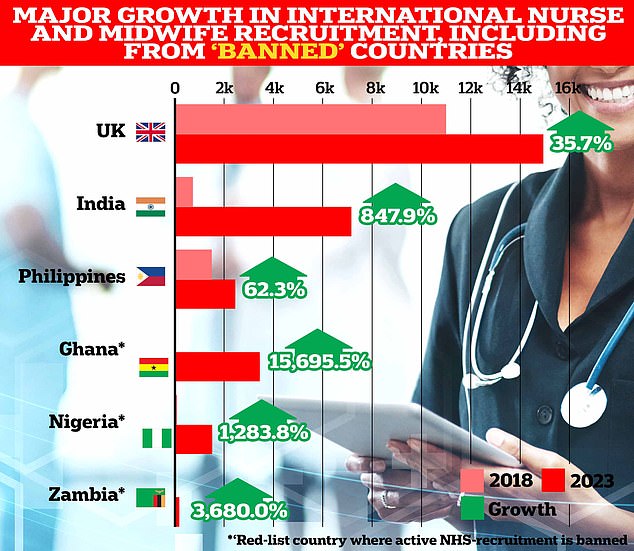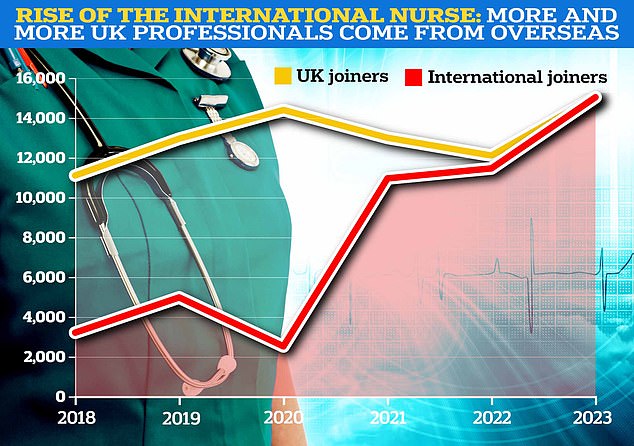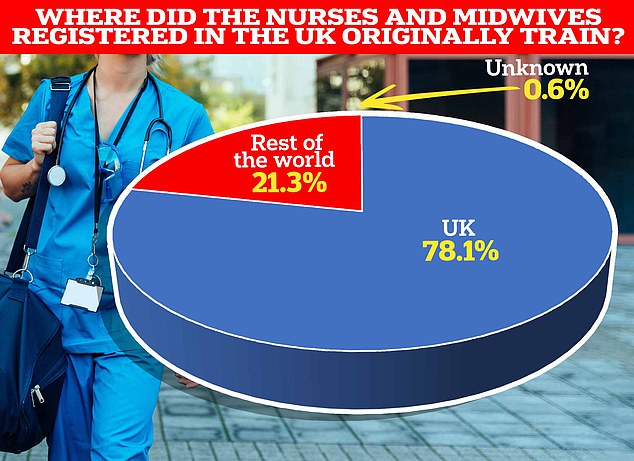Number of nurses and midwives working in NHS hits all-time high of 800,000 amid huge spike in overseas-trained medics from ‘red list’ nations
The number of nurses registered to work in Britain has reached a record high, the nursing regulator said, warning against unethical recruitment from countries with their own shortages.
Some 808,488 nurses, midwives and nursing assistants are now registered with the Nursing and Midwifery Council – an increase of 37,091 in a year.
This includes 748,528 nurses, 42,974 midwives and 10,560 nurses – all more than ever before.
But this comes amid a rise in the number of people joining the register from so-called ‘red list’ countries such as Nigeria and Ghana.
Some 808,488 nurses, midwives and nursing assistants are now registered with the Nursing and Midwifery Council – an increase of 37,091 in a year
These countries have their own staffing problems and Department of Health and Social Care guidelines tell the NHS not to actively recruit from them.
Figures from the NMC show that 3,071 people from red list countries joined the nursing register in the six months to September 30.
A total of 24,905 professionals from red-listed countries were in the register as of September 30, 2023.
The new NMC figures also show a growing number of UK workers, following a recent expansion in the number of nurse training places.
Some 30,103 people joined the nursing register in the six months to September 30, including 15,067 from Britain.
Meanwhile, the proportion of nurses from a black or minority ethnic background now stands at 29.1 percent.
Andrea Sutcliffe, chief executive and registrar at the NMC, said: ‘Strong recruitment and steady retention have taken our register of nurses, midwives and nursing assistants to a new record.

There are concerns about a rise in the number of people joining the register from countries on the ‘red list’, where active NHS recruitment is banned. This graph shows the growth in the number of nurses and midwives joining the NMC register, based on where they originally trained. While recruitment of UK-trained, as well as Indian and Filipino, professionals has increased, the numbers from supposedly red-listed countries have exploded in the past five years, from just a handful to thousands.
‘This is very encouraging given the well-publicised pressures on healthcare and care services at a time of increasing healthcare demand.
‘Our register now shows 50-50 recruitments between UK and internationally trained nurses and midwives.
‘All these professionals make an essential and welcome contribution to people’s health and well-being.
‘However, it is important that employers remain aware of the government’s ethical recruitment code as we see many new hires from red list countries.
‘People from all over the world want to come and work in Britain.
“However, employers should not undermine healthcare systems in countries with the most pressing workforce challenges through active recruitment.”
Professor Nicola Ranger, chief nurse at the Royal College of Nursing, said: ‘The key findings of this report do not reflect what nurses are seeing on the frontline of the NHS.
‘Since 2019, the NHS waiting list has grown four times faster than the number of nurses, meaning there are not enough staff to provide the excellent care patients deserve.
“The government’s overreliance on unethical international recruitment from red list countries has become the norm and cannot continue. It’s a false economy.

The NMC data also shows how new entrants to the register are now split 50/50 between British-trained professionals and people from other countries. A total of 30,103 people joined the nursing register in the six months to September 30, including 15,067 from Britain, just 31 more than from international sources

Despite the rise of international recruits, British-trained professionals still make up the vast majority of those on the NMC register
‘The government must invest in nursing staff in Britain, by funding nurse training and fair pay – and not destabilize other healthcare systems.’
It comes after nurses said they were ‘shocked’ by the deal between the government and consultants in England, which will see some get a pay rise of around 19 per cent.
The RCN did not agree to the pay deal, which saw them receive a 5 percent pay increase for 2023/2024 and a cash increase for last year, but union members decided not to continue with the strike after it was imposed in the summer.
However, the RCN reacted angrily to the pay offered to the country’s top doctors, suggesting the news would make nursing strikes ‘more likely in the future’.
It has called on the government to reopen talks on nurses’ pay.
Dr. Billy Palmer, senior fellow at the Nuffield Trust, a health think tank, said: ‘The health service is not benefiting equally from the growth in the number of registered nurses, with, for example, the number of registered nurses with learning disabilities continuing to fall.
‘It is crucial that although there is an increase in the number of British-trained nurses joining the register, many will not join the NHS.
‘We have highlighted the need to plug the leaks in the pipeline for home-grown doctors, and policymakers need to gain a better understanding of why so many are taking up jobs outside the NHS, including in the private sector.
‘We are increasingly relying on foreign nurses to fill the gaps where we struggle to attract domestic workers.’
Miriam Deakin, director of policy and strategy at NHS Providers, which represents NHS trusts, said: ‘While foreign healthcare workers in Britain are invaluable, the increase in the number of participants from ‘red list’ countries is worrying.
‘International recruitment must be done ethically, in line with the Department of Health and Social Care’s code of practice.
‘The NHS Long Term Workforce Plan aims to encourage domestic training alongside international recruitment.
‘To realize this, the plan must be sufficiently financed by the government.’
Sean O’Sullivan, head of health policy at the Royal College of Midwives, said there is a shortage of around 2,500 midwives in the NHS in England, adding: ‘While it is positive to see the number of people trained and registered as a midwife is increasing, this is not the same as the number of midwives working in the NHS.’
Ruth May, head of nursing at NHS England, said: ‘Nurses are essential to delivering high-quality care to millions of patients every day and I’m delighted that we now have a record number of registered nurses in England.
‘Recognizing that we need to go further, the NHS Long Term Workforce Plan commits to doubling the number of training places for adult nurses by 2031 so that we can build on the important progress that has already been made.’
